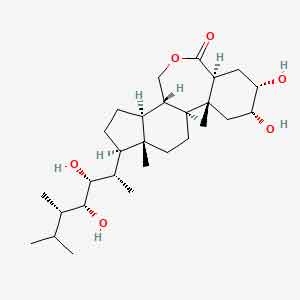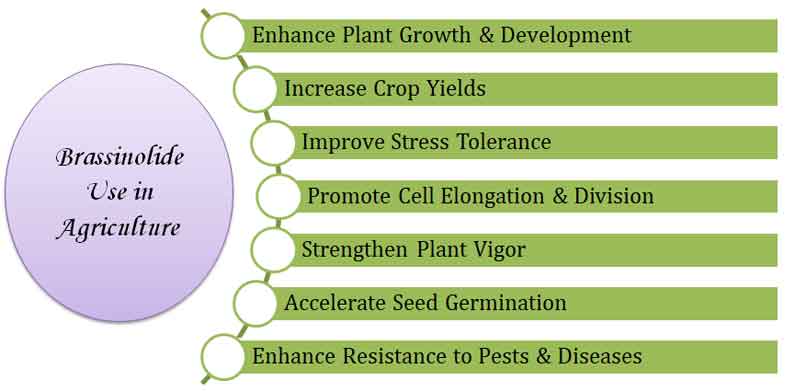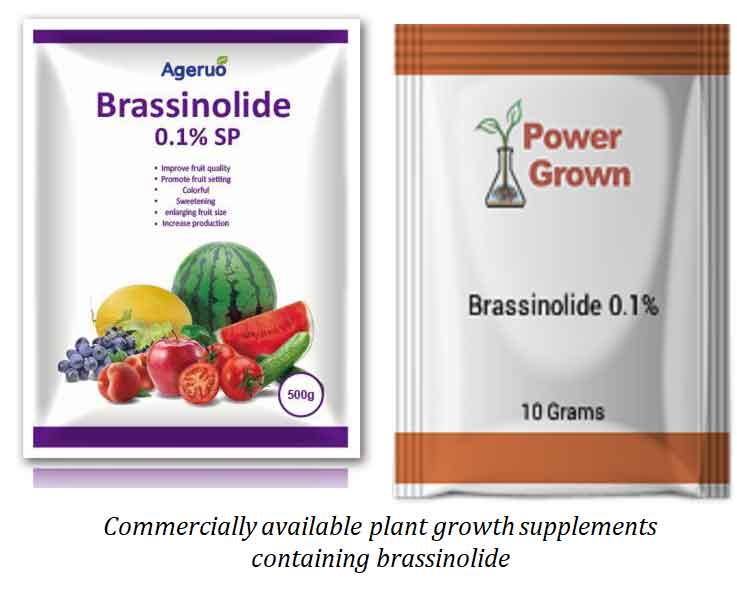What is brassinolide?
Brassinolide is a plant hormone and the first identified brassinosteroid. It was discovered when rapeseed (Brassica napus) pollen was found to promote stem elongation and cell division. The active compound responsible was isolated and named brassinolide. Brassinolide has a vital function in regulating different plant functions like seed germination, aging, and resilience to environmental and biological pressures. This post summarizes the Brassinolide Use in Agriculture.
Also read: Brassinosteroids and its Physiological Effects
Brassinolide Structure
How is brassinolide synthesized?
Ø Brassinolide production starts with campesterol, a sterol in the cell membrane.
Ø The enzyme DET2 reduces campesterol, followed by several oxidation reactions by cytochrome P-450 enzymes, which add hydroxyl groups.
Ø The crucial step is the C6 oxidation, which forms a ketone at the C6 carbon and boosts the molecule’s activity by 200 times.
Ø This C6 oxidation can happen early or late, depending on light exposure.
Ø In Arabidopsis seedlings, the late pathway is dominant in light, while the early path is active in darkness.
Ø If C6 oxidation does not occur, the plant shows severe growth deficits, known as the “Dwarf phenotype.”
In agriculture, brassinolide is used to:
- Enhance plant growth and development.
- Increase crop yields.
- Improve stress tolerance (e.g., drought, salinity, temperature extremes).
- Promote cell elongation and division.
- Strengthen plant vigor and overall health.
- Accelerate seed germination and root development.
- Enhance resistance to pests and diseases.
| You may also like NOTES in... | ||
|---|---|---|
| BOTANY | BIOCHEMISTRY | MOL. BIOLOGY |
| ZOOLOGY | MICROBIOLOGY | BIOSTATISTICS |
| ECOLOGY | IMMUNOLOGY | BIOTECHNOLOGY |
| GENETICS | EMBRYOLOGY | PHYSIOLOGY |
| EVOLUTION | BIOPHYSICS | BIOINFORMATICS |
Brassinolide Use in Agriculture
Brassinolide enhances plant growth, boosts crop yields, and improves stress tolerance, leading to healthier and more resilient plants in agriculture. Brassinolide use in agriculture can be summarized in the following heads:
(1). Role in Plant Growth and Development
(2). Improving Stress Resistance
(3). Promoting Disease Resistance
(4). Applications in Sustainable Agriculture
Role in Plant Growth and Development
Ø Brassinolide has numerous physiological processes in plants.
Ø They regulate cell elongation and division, which are fundamental for plant growth.
Ø It can influence the development of vascular tissues, roots, and reproductive organs, contributing to overall plant architecture and health.
Ø This hormone can promote stem elongation, leaf expansion, and pollen tube growth, which is crucial for successful reproduction and seed formation.
Improving Stress Resistance
Ø Plants are constantly exposed to abiotic stresses such as drought, salinity, extreme temperatures, and heavy metals.
Ø Brassinolide is reported to enhance the plant’s tolerance to these adverse conditions.
Ø They achieve this by modulating stress-responsive genes and antioxidant enzyme activities, thus protecting cells from oxidative damage.
Ø Under drought conditions, brassinolide-treated plants exhibit improved water-use efficiency and sustained growth, while under saline conditions, they maintain better ion balance and cellular integrity.
Promoting Disease Resistance
Ø In addition to abiotic stress resistance, brassinolide contributes to biotic stress management by enhancing plant immunity against pathogens.
Ø They activate defense mechanisms that include the production of pathogenesis-related proteins and secondary metabolites, which inhibit the growth and spread of pathogens.
Ø This aspect of brassinolide is precious for reducing the reliance on chemical pesticides and promoting more sustainable and eco-friendly agricultural practices.
Applications in Sustainable Agriculture
Ø The use of brassinolide aligns with the principles of sustainable agriculture.
Ø By promoting robust plant growth and enhancing stress resistance, they can reduce the need for chemical fertilizers, pesticides, and herbicides.
Ø This not only lowers production costs for farmers but also minimizes the environmental impact of agricultural practices.
Ø Moreover, brassinolide is biodegradable and non-toxic, ensuring their use does not lead to harmful residues in the soil or water bodies.
Prospects and Challenges
Ø Despite the clear benefits of brassinolide, its widespread use in agriculture faces certain challenges.
Ø The cost of synthesizing and applying brassinolide on a large will be problematic.
Ø Ongoing research seeks to develop cost-effective production methods and formulations that improve the stability and efficacy of this hormone in field conditions.
Summary: Brassinolide holds immense potential for transforming modern agriculture. Their ability to enhance plant growth, improve stress resistance, and promote sustainable farming practices makes them a valuable addition to the agricultural toolbox. As research continues to advance, integrating this phytohormone into crop management strategies is likely to become more feasible and widespread, contributing to increased food security and environmental sustainability.
Key Questions
- What is brassinolide?
- What are the uses of brassinolide in agriculture?
- How is brassinolide synthesized in plants?
- How brassinolide helps to overcome the biotic and abiotic stresses in plants?



